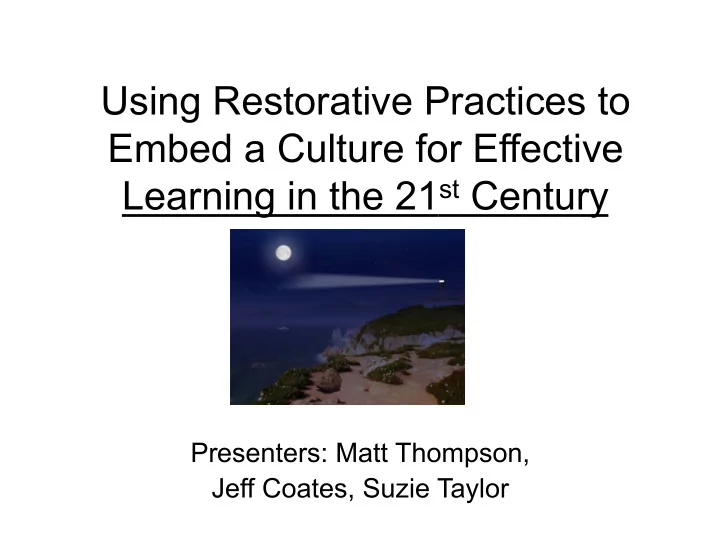

Using Restorative Practices to Embed a Culture for Effective Learning in the 21 st Century Presenters: Matt Thompson, Jeff Coates, Suzie Taylor
Presentation Breakdown: Introduction of Presenters P21 Initiative Habits of Mind Correlation Between Restorative Practices and 21 st Century Skills Clinical Application in the School Setting Questions and Answers
Partnership for 21 st Century Skills Initiative • Founded in 2002 • Advocates for 21 st Century Readiness for all students • Brings together the business community, education leaders, and policy makers
P21 Members • ! • !
State Educational Systems
P21 is the leading source of innovation, tools, and resources for 21 st century education • For Policymakers P21 provides: innovative research, learning tools and opportunities to understand and incorporate 21 st century skills into future-focused education policy. • For Educators P21 provides: innovative resources for implementing and integrating curriculum and assessments for the 21 st century learning.
21 st Century Student Outcomes and Support Systems
Habits of Mind (A.Costa)
16 Habits of Mind (A. Costa) Persisting Persevering at tasks through to completion Managing Impulsivity Acting with forethought and deliberation Listening with understanding & empathy Understanding others Thinking Flexibly Ability to change perspectives, generate alternatives, consider options Thinking about thinking Awareness of and ability to evaluate one’s own thinking and thinking strategies Striving for Accuracy Desire for exactness, fidelity and craftmanship Questioning & Posing Problems A questioning attitude and desire to find problems to solve Applying Past Knowledge to new situations Transferring prior learning to new contexts Thinking & Communicating with clarity Clear & accurate communication, both written & & precision oral Gathering data through all senses Using all sensory pathways to absorb information Creating, imagining, innovating Generating new and novel ideas Responding with wonderment and awe Finding the world awesome and mysterious, and being intrigued with phenomena and beauty Taking responsible risks Prepared to go outside one’s “comfort zone” – to live at the edge of one’s competence Finding humor Finding the whimsical, incongruous and unexpected Thinking interdependently Open to on-going growth and learning, striving for improvement Remaining open to continuous learning Working with, and learning from others, in reciprocal situations
Environmental factors/conditions in which intelligent behaviors seems to prosper: 1. Having faith that all students can think. 2. Students must realize thinking as a goal – active learning vs. passive learning. 3. Challenging problem solving opportunities must be presented. 4. Creating a safe risk-taking environment. 5. Give it time. 6. A rich responsive environment 7. Attention to learner’s developmental readiness and sequence. 8. Modeling.
21 st Century Skills embedded within base tenets of Restorative Practices 21 st Century Skills Restorative Practices Critical thinking & problem solving Building of social capital Communication & collaboration Communication Creativity Engagement Flexibility & adaptability Problem solving Interact effectively with others Provide effective leadership Habits of mind skill development Leadership, responsibility, & accountability
Implementation Common Language : • Introduction to Restorative Practices and Habits of Mind (use of proactive circles) • Evaluation through the use of role playing, media, and curriculum • Weekly thematic circles to expand expertise
What’s in your First Aid Kit? • Support of who’s around you • Journals • Nine Affects • Compass of Shame • Restorative Questioning • Habits of Mind • Making your environment a “home” • Burn Out Rx
Make every moment meaningful… plant seeds and have faith that the seeds will grow…someplace… sometime…
Contact Information Matt Thompson (908) 284-7272 mthompso@hcrhs.org Jeff Coates (908) 619-5469 jeffcoates28@gmail.com Suzie Taylor, LCSW (908) 284-7287 staylor@hcrhs.org
References Costa, A. (2008). The School as a Home for the Mind. Thousand Oaks, CA: Corwin Press. Nathanson, D. (1992). Shame and Pride: Affect, Sex, and the Birth of the Self. New York, NY: W.W. Norton & Company, Inc. Winnicott, D. (1986). Home Is Where We Start From. New York, NY: W.W. Norton & Company, Inc. Resources www.iirp.org www.p21.org www.mindfulbydesign.com www.habitsofmind.org
Recommend
More recommend